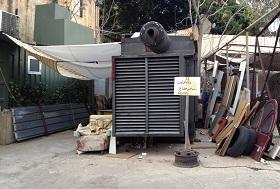Using AI to control energy for indoor agriculture
30 September 2024
Published online 12 March 2013

Lebanon is accustomed to a chronic energy problem, with power regularly going out across the whole country. The hum of diesel generators is the background noise for residents who rely on them for electricity during these daily outages.
A study by researchers at the American University of Beirut (AUB) has found that the concentration of potent atmospheric pollutants spiked in urban areas of Lebanon at peak times for diesel generator use.
The pollutants, a class of gases called polycyclic aromatic hydrocarbons (PAH) that result from burning fossil fuels, are known carcinogens and teratogens. Beirut's air pollution is nearly twice the safe limit set by the U.S. Environmental Protection Agency of 12 micrograms per cubic metre.
The study monitored 184 buildings and 109 generators in the Hamra area of Beirut minute by minute for about two weeks at each site over the course of a year. The team used PAH monitors to record air quality and analyzed the data by constructing a 3D model simulating air flow and pollutant distribution. It determined that about 40% of the PAH in the atmosphere in Hamra came from generators.
Alan Shihadeh, lead author of the study, said: "I expect that in other areas with dense urban morphologies, we will see even higher PAH levels in the air resulting from diesel generators." He warned that the country's continued reliance on diesel generators would lead to higher rates of cancer and respiratory and heart diseases.
The last thing we need is to place diesel generators outside our bedrooms and offices.
Lebanon's decrepit power generation, transmission and distribution system has failed to keep pace with a huge increase in electricity consumption over the last two decades. The country's power insecurity is also a legacy of the 15-year civil war that decimated its infrastructure. The problem was exacerbated by Israeli attacks in 2006 that targeted power stations.
The state electricity company, Electricite du Liban, can only produce about half the power required. In Beirut, electricity is suspended on a daily schedule of three hours between 6am-6pm. Outside the capital the cuts may be for the entire 12 hours. Residents currently have no option but to fill the gap with generators.
Habib Battah, a journalist and the author of the blog beirutreport.com says a better solution would be the production of public power, rather than individuals finding ad-hoc solutions. Battah adds that the high prices charged for privately generated electricity is creating social divides where the poor cannot afford it.
A study published in 2011 by AUB chemist Najat Saliba, who co-authored the study, found that 93% of Beirut's inhabitants were exposed to dangerous air pollutants such as nitrogen dioxide, at levels 50% higher than the limits recommended as safe by the World Health Organization (WHO).
The 2011 study – which also found airborne particulate matter was double that recommended by WHO – measured the impact of vehicle emissions. This study is the first to examine how diesel generators contribute to pollution.
"Beirut already suffers from high levels of air pollution," says Shihadeh. "The last thing we need is to place diesel generators outside our bedrooms and offices."
doi:10.1038/nmiddleeast.2013.34
Stay connected: